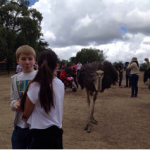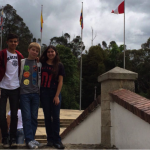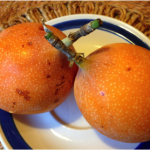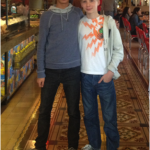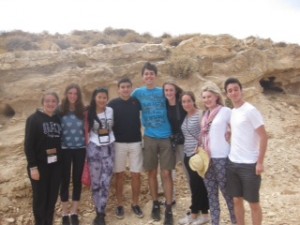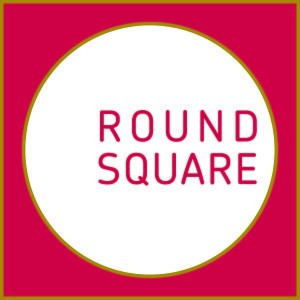 This week I urged our Middle and Senior School students to become uncentered. Yes, uncentered. To be centred is about being balanced, to feel calm and at ease. I value the opportunity to be centred as much as the next person. However, in our lifelong quest to be balanced and focused, I believe that we also benefit from actively seeking opportunities to be uncentered.
This week I urged our Middle and Senior School students to become uncentered. Yes, uncentered. To be centred is about being balanced, to feel calm and at ease. I value the opportunity to be centred as much as the next person. However, in our lifelong quest to be balanced and focused, I believe that we also benefit from actively seeking opportunities to be uncentered.
It is subtle, but I asked our students to notice that the Round Square Associations of schools intentionally placed the name of its organization off-centre in its own logo. This is because one of the key objectives of membership in Round Square is to provide meaningful experiences that take adolescents out of their regular routines and challenge their values, norms and assumptions. This can be done through leadership conferences that explore the six RS IDEALS, and through international exchanges and service projects.
Two weeks ago I returned from Jordan along with Ms. Shadley and six grade 11 LCC students. The international Round Square conference included delegates from 52 schools. All of our students were active participants, very willing to be uncentered.
Just going to Jordan required a good dose of courage. According to our popular media, a trip to the Middle East – and specifically to the Muslim world –is alleged to be a dangerous decision that will inevitably lead to problems with terrorists, extremists and political instability. But that was certainly not our experience!
So, a few thoughts about Jordan… More than anything, it is known for its moderation and openness amongst Muslim states. It is dedicated to the promotion of tolerance, inclusiveness, peacekeeping, dialogue and global citizenship. The Jordanian Prime Minister told all student delegates from the 52 schools gathered that the country has a mission among all Arab states: to be a prototype and example of human commitment to respect and peace. Despite these lofty goals, its territory is small, as is its population – about 8 million – the same as Quebec. Jordan has a lot of strategic borders with countries such as Syria, Saudi Arabia, Iran, Iraq, Egypt, and Israel. Nonetheless, Jordan has a stable political environment and a recent history marked by peace and minimal terrorist activity.
Jordan is a real leader in the region by its response to the recent civil strife in Syria just to the north. Jordan has accepted 1.4 million desperate political refugees from that war-torn country. Consider the impact if we did the same here in Quebec! Unbelievably, Jordan has not shut its borders. Despite the extraordinary financial cost of sheltering so many refugees, Jordan continues to welcome Syria’s war-weary because it believes deeply in its humanitarian responsibilities.
The host RS school, King’s Academy, is a relatively new school. Established in 2007 by Jordan’s King Abdullah, it is the Arab world’s first boarding school – and and the first high school to bring students from all around the world to Jordan to study.
There are many elements of being uncentered that I remember. Every morning, the 5 am call-to-prayer dominated the landscape, as did the call to-prayer- several times throughout the day.
But I was particularly struck by the intelligence and courage of a young female presenter whose life experience is radically at odds with everything our students know, value, and consider normal. Shabana Basij-Rasikh is a 23-year-old Afghani woman who attended a secret primary and secondary school in Afghanistan when the country was under the rule of the Taliban. Under that extremist group’s control, it was illegal for girls to attend school. Yet, Shabana’s parents actually risked death by dressing their daughter as a boy and sent her to a secret school because they valued learning so much.
Shabana’s story is a powerful one. She was successful in school and along the way managed to earn a scholarship to a top American university. She shared with us that despite her good fortune, she felt guilty to be so lucky because less than 1% of Afghan girls receive any post-secondary education or training outside of the home, and 90% of women remain illiterate. So she asked herself, what will I do with this privilege? What will I do with my education?
She told us that the most valued profession in her country is to become a doctor. However, she didn’t see this possibility as her personal passion. She considered becoming a lawyer, but dropped that too because she felt her eventual social impact would be limited. After considering how she would have the broadest impact on Afghan society, she decided to become a teacher – and she challenged our students on this point. She noted to the RS student delegates that 75 million girls in the world today are prevented from receiving an education by governments that actively limit the roles and progress of girls.
At age 23, Shabana has gone on to establish the first boarding school for girls in Afghanistan. SOLA – the School of Leadership in Afghanistan – now teaches 42 girls and wants to grow to 340 students, with girls coming on scholarship from each of Afghanistan’s 34 provinces. Already under Shabana’s dedication and leadership, more than 40 Afghan students have earned close to $10 million in scholarships to study at universities abroad.
I was very impressed by Shabana’s courage, her entrepreneurial skills and her devotion to the teaching, growth and development of young women in Afghanistan. She was very clear that she does not see her role as empowerment. Rather, she describes it “as simply creating space so that young, smart girls can grow into their confident selves”. Very impressive!
Reminding students that very few girls in her country even receive an education, Shabana sees knowledge, training and learning as precious. So she asked delegates to do their best to use their education wisely. Her core question was “How will you give your education a purpose? Is it just for you? Or can you help others help others to raise their voices?
I thank Shabana for those great questions. And the more our students have the courage to become uncentered as they grow older, the easier it will become to answer those questions for themselves. What will they do with their education? – Christopher Shannon, Headmaster

